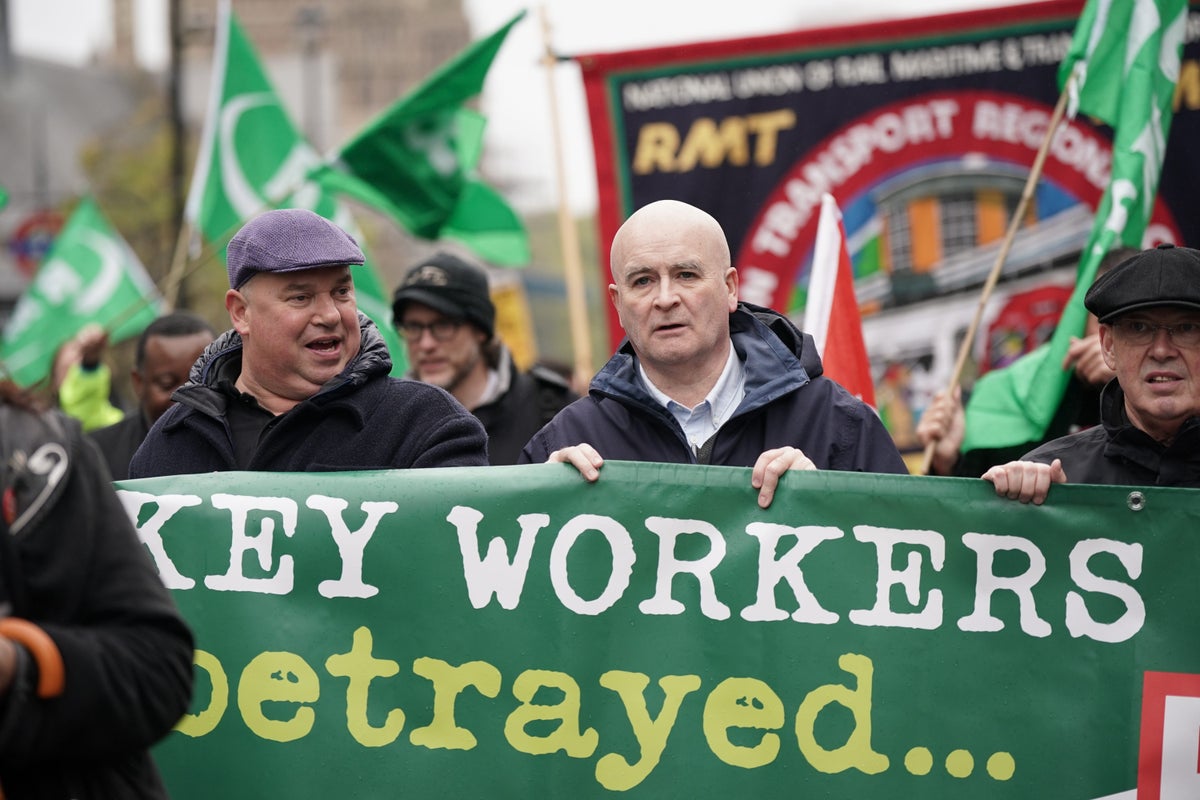
By the end of the next round of national rail stoppages, members of the RMT union who work for Network Rail will have been on strike for 20 days in 200 since midsummer 2022. An overtime ban that has run for weeks over Christmas and new year has cut earnings still further.
But as the longest sustained shutdown of large parts of the rail network since 1989 began, the boss of the main rail union said the walk-outs have been effective.
Speaking exclusively to The Independent, general secretary Mick Lynch said: “We’ve put it on the front page of the papers that they are planning to cut 50 per cent of maintenance scheduled tasks.
“They’re prepared to take risks with safety. They’re prepared to rip up our members’ conditions in order to save money and we’ve stopped them implementing the changes that they wanted to implement two years ago.
“We don’t accept the changes. We don’t accept they’re necessary.
“It’s not reform, is it? It’s cuts.”
Another round of rail industry walk-outs has begun, leaving Britain with only a skeleton service for the first working week of the new year.
More than 40,000 members of the RMT union employed by Network Rail and 14 train operators are stopping work for 48 hours on 3-4 and 6-7 January.
On the intervening day, Thursday 5 January, thousands of train drivers belonging to the Aslef union and working for 15 train operators will strike.
Mr Lynch said his members’ lost earnings, which are now running to thousands of pounds for some workers, would not make an agreement more difficult.
“The price is the same. We’ve got to have a settlement on the conditions. We’ve got to have a job security agreement. We’ve got to get a pay deal.
“What we need to do now is to move towards a settlement. And the only people that can facilitate that are the government, who are doing nothing whatsoever.”
The latest figures from the Office of Rail and Road show the number of passengers has fallen by 20 per cent compared with pre-Covid figures, while ticket revenue has fallen by 29 per cent.
The government insists that the precarious financial state of the railway demands urgent reforms, from modernising maintenance to making Sunday part of the working week for all rail companies.
But the RMT general secretary said more staff are necessary, not fewer.
“Every day on the railway when our members are working, they make announcements saying trains are not running due to staff shortages,” he said.
“At the same time, they want to cut thousands of jobs out of the railway system.
“You can’t have it both ways. You’ve either got the right amount of people or the wrong amount of people.
“They are saying they haven’t got enough people to run the railway.
“So if they were able to provide a proper service at the right price, instead of constantly racking up the prices and allowing the train operating companies, the rolling stock leasing companies and Network Rail subcontractors to take out hundreds of millions of pounds, then we could have a system that runs on behalf of the people.
“What we don’t want is private-sector operators ripping off the taxpayers and ripping off the farepayers while imposing cuts on our system.
“We need changes in the interest of the railway industry and the interests of railway users.”
He called for “a properly funded railway that’s got safety and proper staffing levels in the right direction”.
Mr Lynch said it would require: “Proper fares, discounts for travellers and a system that is integrated across the transport network, with the bus, with the ferries, with the Tube and with the Metro operators so that we get a proper system in favour of people – not in favour of the profitmongers that we’ve current got ripping off our industry and ripping off the public.”
Mark Harper, the transport secretary, has insisted that modernisation must be part of the settlement with the rail unions.
Speaking to Good Morning Britain immediately after the ITV programme had interviewed Mr Lynch, he said: “The deal is not going to be done in TV studios, it is going to be done around a negotiating table between the trade unions, the train operating companies that run the trains, and Network Rail that run the track and the signalling.
He added: “We had some good meetings before Christmas, we have got some more meetings scheduled next week.
“I would, frankly, rather they were taking place this week rather than the strikes happening, but that was a matter for the unions.
“It is RMT and Aslef ithat have scheduled strikes for this week; I would rather they were sat around the negotiating table.”







